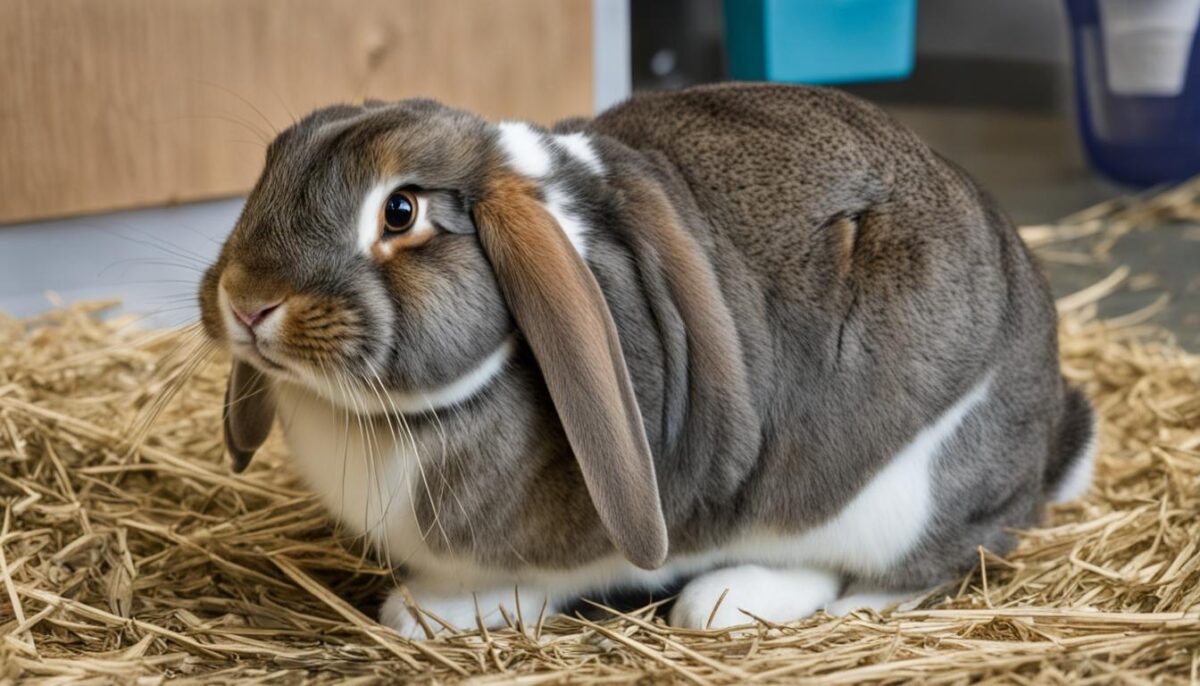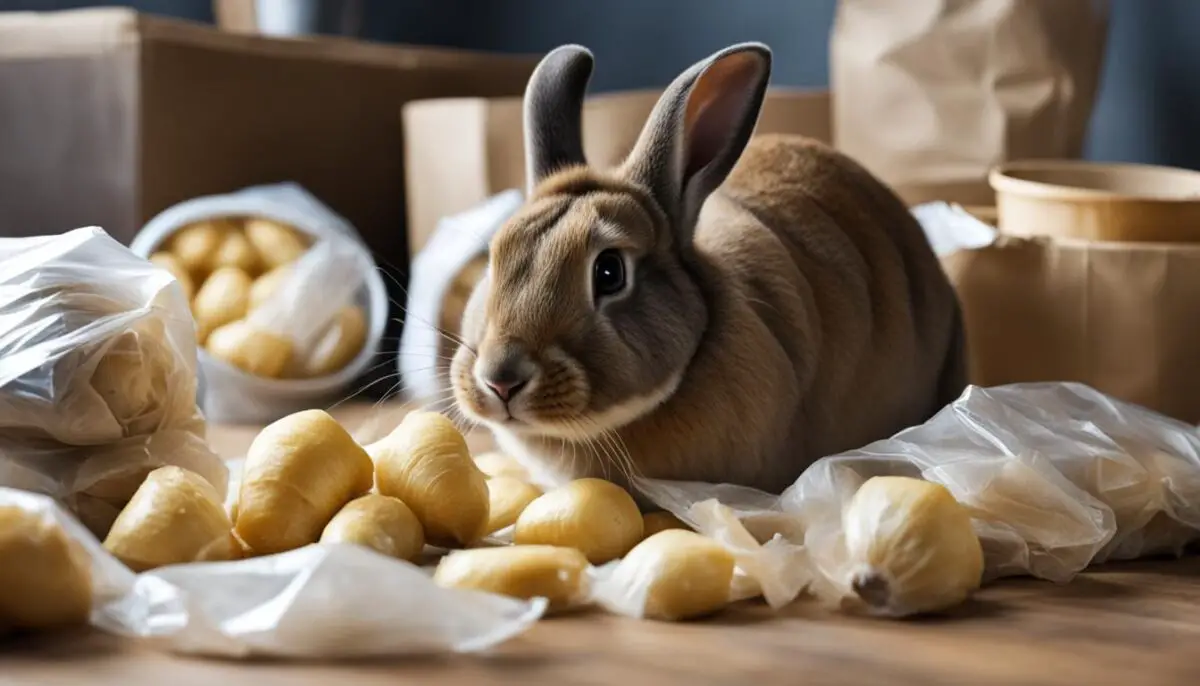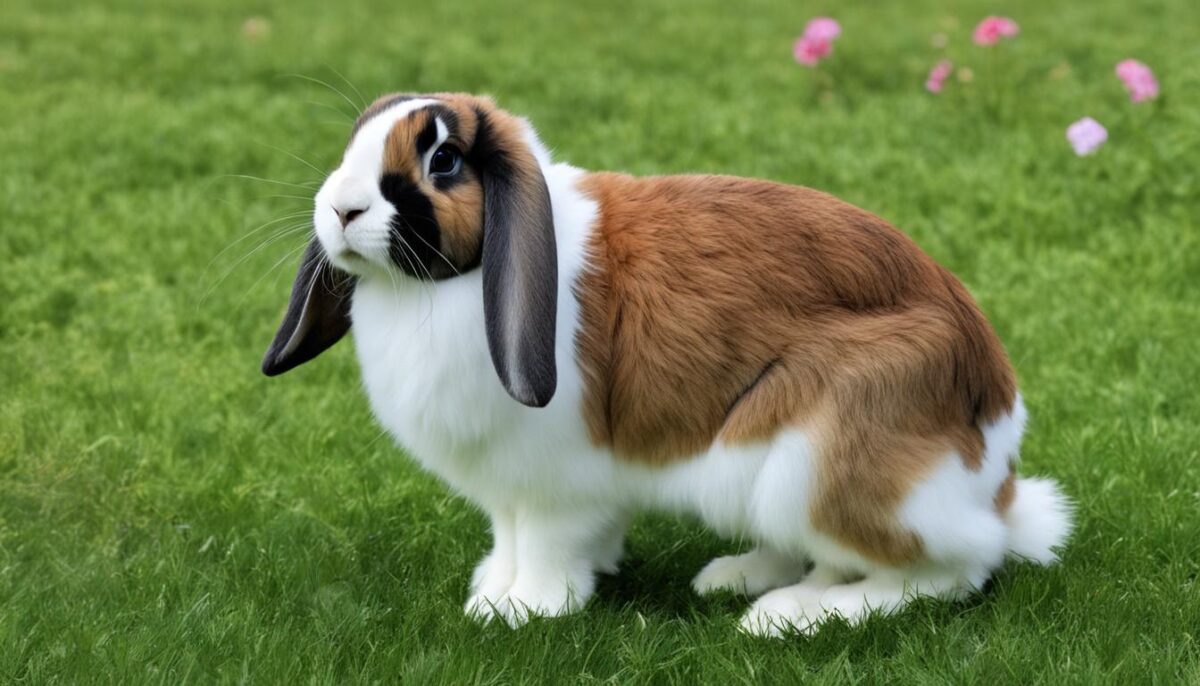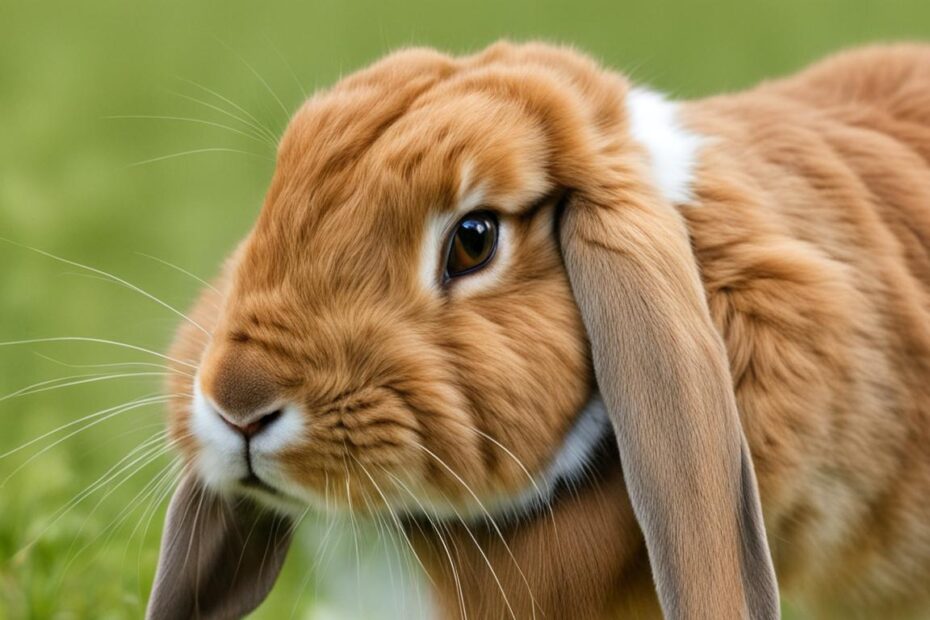Floppy eared rabbits, also known as lop-eared rabbits, are incredibly adorable pets that are popular among rabbit owners. However, caring for these rabbits requires some special considerations. Lop-eared rabbits are more prone to ear infections, dental problems, and obesity compared to other rabbit breeds. Therefore, it is important to provide these rabbits with a strict diet, regular ear cleanings, and proper dental care. In this article, we will explore the specific differences and unique care requirements for floppy eared rabbits.
Key Takeaways:
- Lop-eared rabbits require special care due to their higher risk of ear infections, dental problems, and obesity.
- Regular ear cleanings are crucial for maintaining the health and cleanliness of lop rabbit ears.
- Proper dental care, including a healthy diet and regular teeth checks, is essential for preventing dental issues in lop-eared rabbits.
- Preventing obesity in lop-eared rabbits requires providing a balanced diet and ample exercise.
- Understanding lop rabbit body language can help owners better gauge their pets’ emotions.
- There are various breeds of floppy eared rabbits, each with its own unique characteristics and size variations.
- Consulting a veterinarian specializing in rabbits is recommended for personalized guidance on caring for lop-eared rabbits.
Quotes
“Regular ear cleanings are essential to prevent impactions and maintain the health and cleanliness of lop rabbit ears.”
“By following the veterinarian’s advice and incorporating regular ear cleanings into the rabbit’s grooming routine, lop-eared rabbit owners can help ensure the long-term health and comfort of their pets.”
In the next section, we will discuss the importance of dental care for lop-eared rabbits and how to ensure their dental health.
Dental Care for Lop-Eared Rabbits
Lop-eared rabbits are more prone to dental problems compared to other rabbit breeds. According to a study, lop rabbits have a higher risk of developing issues with their incisor and cheek teeth. Proper dental care is essential to prevent and address these problems.
To maintain good dental health in lop-eared rabbits, a healthy diet is crucial. Providing them with grass-based hay, fresh leafy greens, limited pellets, and treats helps promote proper tooth wear and prevents dental issues. These dietary options encourage natural chewing behavior, which is vital for keeping their teeth in check.
Regular teeth checks are also essential for lop-eared rabbits. Owners should schedule routine veterinary visits to ensure any dental issues are detected and addressed early on. Signs of dental problems include changes in eating habits, drooling, bad breath, and weight loss. If any of these indicators are observed, it’s important to seek prompt veterinary care.
“Proper dental care is crucial for lop-eared rabbits to maintain good oral health and overall well-being.”
Awareness and vigilance are key when it comes to dental care for lop-eared rabbits. By providing them with a nutritious diet and regular check-ups, owners can help prevent and manage dental issues, ensuring their furry companions lead happy, healthy lives.

| Dental Care Tips for Lop-Eared Rabbits |
|---|
| Provide a diet rich in grass-based hay, fresh leafy greens, limited pellets, and treats to encourage proper tooth wear. |
| Schedule regular veterinary check-ups to monitor dental health and address any issues early on. |
| Watch for signs of dental problems such as changes in eating habits, drooling, bad breath, and weight loss. |
Preventing Obesity in Lop-Eared Rabbits
Lop-eared rabbits, especially those bred from French Lops, are susceptible to rapid weight gain, which can lead to obesity. Obesity poses serious health risks for rabbits, particularly due to their sensitive digestive systems. To keep your lop rabbit at a healthy weight, it is crucial to implement a balanced diet and provide ample exercise.
Start by feeding your lop rabbit a nutritious diet that consists of high-quality hay, fresh vegetables, and limited pellets. Avoid overfeeding and offering too many treats, as this can contribute to weight gain. Provide fresh water at all times and monitor your rabbit’s food intake to ensure they are not consuming excessive calories.
Exercise plays a vital role in preventing obesity in lop-eared rabbits. It is recommended that rabbits have at least two hours of exercise time in a larger area each day. This can be achieved by allowing your bunny to explore a rabbit-proofed room or by providing a secure outdoor playpen. Morning or evening exercise sessions align with a rabbit’s natural activity patterns and can be particularly beneficial.
When it comes to housing, it is essential to provide a spacious enclosure for your lop rabbit. The enclosure should be at least three to four times their full length, allowing sufficient room for movement. This will encourage your bunny to stay active throughout the day and help prevent them from becoming sedentary.
Regularly interact with your lop rabbit through supervised playtime, which can enhance their physical activity levels and mental well-being. Engaging toys, tunnels, and climbing structures can add variety and stimulation to their exercise routine.
Benefits of Exercise for Lop Rabbits
Exercise offers numerous benefits for lop-eared rabbits, including:
- Weight management: Regular exercise helps burn calories and maintain a healthy weight for your lop rabbit.
- Muscle tone: Active play and movement contribute to improved muscle tone and strength.
- Stimulation: Exercise provides mental stimulation, preventing boredom and promoting overall well-being.
- Prevention of health issues: Active rabbits are less likely to experience obesity-related health problems such as heart disease and joint issues.
Remember, it is crucial to consult with a veterinarian specializing in rabbits for personalized advice on preventing obesity in lop-eared rabbits. They can provide guidance on diet, exercise, and optimal housing conditions to ensure the long-term health and well-being of your furry friend.

Understanding Lop Rabbit Body Language
Lop-eared rabbits have a unique body language compared to rabbits with upright ears. While they have limited control over their ears, lop rabbits can still move them slightly to communicate their emotions. Observing their ear positions can provide insights into their moods.
- Ears pushed forward: indicate curiosity or caution
- Rotated ears: suggest attentiveness to sounds
- “Airplane ears”: where the ears are lifted straight out horizontally indicate excitement or alertness
It is important for rabbit owners to familiarize themselves with lop rabbit body language to better understand their pets’ emotions. By paying attention to their ears and combining it with other physical cues such as body posture and vocalizations, owners can build a stronger bond with their lop rabbits.

French Lops are one of the largest lop breeds, weighing around 10 pounds. They have a sweet and docile temperament, making them excellent companions. French Lops have a distinctive appearance, with their long body, broad head, and luscious ears.
2. Mini Lops (Holland Lops)
Mini Lops, also known as Holland Lops in the US, are smaller in size compared to French Lops. They typically weigh over 6 pounds. Mini Lops are playful and friendly, making them great pets for families with children. These adorable rabbits have a compact body, rounded face, and floppy ears.
3. English Lops
English Lops are famous for their exceptionally long and droopy ears, which can reach up to 21 inches in length! They are gentle and calm in nature, making them a popular choice among rabbit enthusiasts. English Lops have a medium-sized body and a wide head.
4. American Fuzzy Lops
American Fuzzy Lops combine the floppy ears of lop breeds with the wooly coat of Angora rabbits. They have a friendly and inquisitive personality, making them great companions. American Fuzzy Lops have a compact body, rounded face, and fluffy ears.
5. Lionhead Lops
Lionhead Lops are a charming crossbreed between Lionhead rabbits and lop-eared breeds. They have a beautiful mane of fur around their head, resembling a lion’s mane. Lionhead Lops are affectionate and social, enjoying interaction with their owners. They have a small to medium-sized body and floppy ears.
Each floppy eared rabbit breed has its own unique characteristics and size variations. Whether you prefer the large and docile French Lop or the compact and playful Mini Lop, there’s a floppy eared rabbit breed out there that’s perfect for you. Remember to provide plenty of love, care, and attention to ensure a happy life for your floppy eared rabbit!
Conclusion
Caring for floppy eared rabbits requires special attention to their specific needs, including ear care, dental care, weight management, understanding their body language, and choosing the right breed. By providing the appropriate care, a nutritious diet, and a loving environment, floppy eared rabbits can flourish as delightful and lovable pets.
Remember to seek personalized guidance from a veterinarian who specializes in rabbits to ensure the best care for your specific lop-eared rabbit. With the right care, your floppy eared rabbit can enjoy a long, happy, and healthy life as a cherished member of your family.
Whether you’re considering a floppy eared rabbit as a pet or already have one, it is important to stay informed about their unique care requirements to provide them with the best possible quality of life. By being attentive, knowledgeable, and compassionate, you can create a wonderful bond with your floppy eared rabbit and enjoy the incredible joy and companionship they bring.
FAQ
What are some special considerations for caring for floppy eared rabbits?
Floppy eared rabbits, also known as lop-eared rabbits, require special care due to their increased susceptibility to ear infections, dental problems, and obesity. It’s important to provide them with a strict diet, regular ear cleanings, and proper dental care.
How do I take care of lop-eared rabbit ears?
Lop-eared rabbit ears are more prone to infections and infestations. Regular ear cleanings are crucial to maintain their health and cleanliness. Consult a veterinarian specializing in rabbits for guidance on the proper ear cleaning process and suitable cleaning solutions.
What dental care do lop-eared rabbits need?
Lop-eared rabbits have a higher risk of dental problems compared to other breeds. It’s crucial to provide them with a healthy diet that includes grass-based hay, fresh leafy greens, limited pellets, and treats. Regular teeth checks are also essential to address any dental issues early on.
How can I prevent obesity in lop-eared rabbits?
Lop-eared rabbits, particularly those bred from French Lops, have a tendency to gain weight quickly. To prevent obesity, provide them with a healthy diet and ample exercise. Their enclosure should be spacious, and they should have at least two hours of exercise time in a larger area each day.
How can I understand lop rabbit body language?
Lop-eared rabbits have a unique body language compared to rabbits with upright ears. Observing their ear positions can give insights into their moods. For example, pushed-forward ears indicate curiosity or caution, rotated ears suggest attentiveness to sounds, and lifted, horizontal ears indicate excitement or alertness.
What are some popular floppy eared rabbit breeds as pets?
Some popular breeds of floppy eared rabbits include French Lops, Mini Lops (known as Holland Lops in the US), English Lops, American Fuzzy Lops, and Lionhead Lops. Each breed has its own unique characteristics and size variations.
How can I care for floppy eared rabbits as pets?
Floppy eared rabbits require special care and attention. It’s important to provide them with a healthy diet, regular ear cleanings, and proper dental care. Understanding their body language and choosing the right breed for your preferences and lifestyle are also crucial. Consult a veterinarian specializing in rabbits for personalized guidance on caring for your specific lop-eared rabbit.


